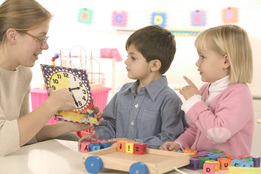
Check out the entire series here:
Toddler Speech & Language Developmental Milestones - Birth to Age 1
Toddler Speech & Language Developmental Milestones: Age 1-2
Toddler Speech & Language Developmental Milestones: Age 2-3
 As a speech-language pathologist I'm often asked about speech development in children. Once a parent finds out what I do, I'm immediately asked, "What should my child be saying at age 3?", "Should my two year old say his /r/ sound yet?" or "Why does my toddler say tat instead of cat?" Because of these questions I've decided to do a series of blog posts about speech and language developmental milestones for toddlers. I'll start from birth and end at age three. Not only will I cover expressive language (what a child says), but I'll also talk about receptive language (what a child understands). Stay tuned for the first post in this series! Check out the entire series here: Toddler Speech & Language Developmental Milestones - Birth to Age 1 Toddler Speech & Language Developmental Milestones: Age 1-2 Toddler Speech & Language Developmental Milestones: Age 2-3
0 Comments
 I love being a speech-language pathologist (we are called SLP's for short!). It is a "feel good" job, and it's also very rewarding. By helping your clients and patients you're giving them one of the greatest gifts of all.....communication! The path to become an SLP can be challenging There is a lot of school involved, so it may not be for the faint of heart! Not only do you have to have a four year undergraduate degree, you also have to have a graduate degree which is an additional two to three years. The undergraduate degree starts with all of the prerequisite classes. Some of these include anatomy and physiology (this class made me nervous!), articulation disorders, and voice disorders (one of my favorites!). Most of these classes are taken during your junior and senior years of college. If you plan to become an SLP and have another undergraduate major you will have to take the prerequisite classes in order to be accepted into graduate school. In addition to your classes you also have to log several hours observing an SLP when she is working with her patients and clients. When I was working on my bachelor's degree it was 25 hours, but it may have changed now. Graduate school is the next step. It was the most difficult, fun, interesting, and time consuming thing I've ever done (well, besides being a mom to infant twins!). The classes are more advanced and this is where you really learn the foundation to becoming an SLP. Some graduate classes include neuro anatomy and physiology, motor speech disorders, and dysphagia. Not only do you attend classes, but you also have to start conducting assessments and leading speech therapy sessions with adult and children clients. Some of these sessions are in the public school system, hospitals, nursing homes, private practices and the graduate school clinic. The therapy sessions are also supervised by a licensed and certified speech-language pathologist. Once you have logged all of your clinical hours you can take the Praxis Exam in Speech-Language Pathology which is basically a board exam to become an SLP. Finally, you finish your thesis or take your comprehensive final exams and graduate with a masters degree. My degree is a Master of Science in Communicative Disorders. The last and final step to becoming an SLP is to complete your clinical fellowship year (CFY) under a licensed SLP. This is basically an internship. Of course you get paid for this which is nice especially after attending so many years of school! Once you finish your CFY you turn in your paperwork to the American Speech-Language Hearing Association to get your Certificate of Clinical Competence (CCC) and to your state's licensing agency to obtain your state license so you can practice. Finally you can start using the credentials you worked so hard for which is the CCC-SLP. So, do you think you want to become a speech-language pathologist? . |
AuthorWelcome! I'm Rebecca Haas, toddler speech-language pathologist and mother to identical twin baby girls. On this blog you'll find articles, resources, and lots of information about early childhood and speech and language development. I hope you find this helpful! Archives
October 2018
Categories
All
This blog is featured on:
|
|
© 2015 Talking With Toddlers. All Rights Reserved.
|
